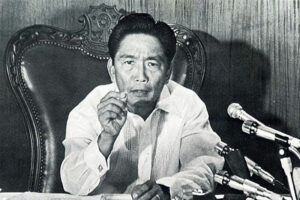Court junks ill-gotten wealth case vs elder Marcos

THE PHILIPPINES’ anti-graft court has dismissed an ill-gotten wealth case against the late dictator Ferdinand E. Marcos, Sr., his wife Imelda and their business associates for insufficient evidence.
In a 45-page decision dated June 27, the Sandiganbayan Second Division said government prosecutors had failed to prove the late president and his wife conspired with their cronies to acquire ill-gotten wealth.
“A judicious perusal of the evidence on record shows that the plaintiff failed to sufficiently prove the allegations in its amended complaint,” Associate Justice Arthur O. Malabaguio said. “In particular, the plaintiff failed to establish that the subject properties were ill-gotten.”
The Presidential Commission on Good Government (PCGG) filed the case in 1987 and accused the Marcos family’s business associates of acting as their dummies by buying shares in several companies.
Cleared were spouses Modesto and Trinidad D. Enriquez and their heir Leandro Enriquez, spouses Rebecco and Erlinda E. Panlilio, Don M. Ferry, Roman A. Cruz, Jr. and Gregorio R. Castillo. Most them have died and were substituted by their heirs.
The shares in question were of Fantasia Filipina Resorts, Inc., Hotel Properties, Inc., Monte Sol Development Corp., Ocean Villas Condominium Corp., Olas del Mar Development Corp., Philippine Village Hotel, Philroad Construction Corp., Puerto Azul Beach and Country Club, Inc., Silahis International Hotel, Sulo-Dobbs Food Services, Inc. and Ternate Development Corp.
The court said most of the documentary evidence presented by the prosecutors were mere photocopies and were barely readable.
A record custodian of the PCGG, the government’s sole witness, could not verify the documents.
Citing the court’s rules of evidence, the Sandiganbayan said documents presented as evidence should abide by the “best evidence rule,” which requires original documents to be presented in court.
“Nothing on the face of these documents shows that defendants Ferdinand E. Marcos and Imelda R. Marcos had any interest or control over the subject corporations,” it said.
“Verily, nothing in these documents would show that said corporations or the amounts paid in the stock came from the government nor were acquired by them through illegal means or through their relationship with the Marcoses.”
Earlier this month, the Sandiganbayan rejected a government plea to allow it to present a new witness in another ill-gotten wealth case against the business associates of Mr. Marcos and the former first lady.
A popular street uprising toppled the dictator’s regime in February 1986, forcing him and his family to flee into exile in the United States.
That same year, his successor, the late Corazon C. Aquino, set up the PCGG to go after ill-gotten assets of the elder Marcos, his family and cronies that were amassed during his two-decade rule.
His son and namesake is now the Philippine president.
The Sandiganbayan last month denied the Marcos family’s appeal to regain control of some frozen bank accounts and properties seized by the government.
Political experts have said an unfavorable judgment against the Marcoses could lead to a constitutional crisis since law enforcers are under the president.
In 2003, the Philippine Supreme Court awarded the Philippine government $658 million (P36.4 billion) of the dictator’s frozen Swiss bank deposits. — J.V.D. Ordoñez




